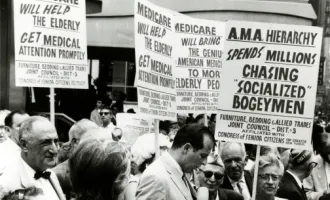
The Asclepius Effect: UCSF Aims at Carbon Neutrality
As many of us return from or look forward to holiday breaks with family — joyous, frustrating or difficult though they may be — there is also a larger family meeting we as healthcare professionals and Earth inhabitants should be taking part in: the family meeting for Patient Earth.
I described this concept in my previous article, Getting the Diagnosis Right on Climate Change, where I also proposed that Earth’s ecological constellation of symptoms, as well as its origin in the fossil fuel industries that feed our industrialized societies, is remarkably similar to that of human diabetes. I finished by inviting the UCSF community to enact this family meeting-style forum on campus, letting our team-based strengths and bedside empathy shine upon the difficult conversation of climate change.
And so, last week, a group of UCSF students, faculty, wider community members, and even patients gathered in the S-214 auditorium to participate in the first Family Meeting for Patient Earth. The focus was on drawing out the connection between the work we are already doing and the work to be done to treat and take care of humans, ecosystems and global climate whose health is inextricably connected. Participants told personal stories of their induction into climate and health advocacy, drew parallels between the fight against Big Tobacco and the fossil fuel industry, and practiced empathy for the range of emotional reactions that discussion of climate change elicits, both on the national stage and in intimate conversation.
The session concluded with a variety of tactics, from social media campaigns to professional petitions to on-campus sustainability pledges, that UCSFers can integrate and enact in their busy lives.
This week, the 21st UN Climate Change Conference, known as the Conference of Parties or COP21, kicks off in Paris, with the hopes of creating a global treaty to begin to turn back the tide on runaway global greenhouse emissions. The University of California system is playing on outsized role in the ambitions and goals of this conference through the UC President’s Carbon Neutrality Initiative 2025, which aims to get all UC campuses to net-zero greenhouse emissions in 10 years by rapidly scaling up sustainable practices and clean energy solutions.
Ten of these scalable solutions are outlined in a recently released Bending the Curve report, which will be presented at COP21 and is already stirring up a lot of interest as one of the first large-scale projects to put carbon neutrality squarely in the crosshairs.
Though I hope you’ll all read the short Bending the Curve solutions list http://universityofcalifornia.edu/news/uc-researchers-present-10-scalable-solutions-climate-change, health students, professionals and scientists don’t need to become renewable energy experts to lend their expertise and prestige to the decade-long endurance race for carbon neutrality. In fact, solutions number two and three on this list of 10 are squarely about “societal transformation,” with the proposal to “combine technology and policy solutions with innovative approaches to changing social attitudes” and to “deepen the global culture of climate collaboration by designing venues where stakeholders, community and religious leaders converge around concrete problems with researchers and scholars from all academic disciplines.”
Leaders from outside the Earth Sciences disciplines are particularly well-positioned to create this societal transformation. Since Pope Francis began to speak about the moral and religious imperative of responding to climate change and published his Vatican encyclical on the environment in June, public opinion polls have shown a “Francis Effect” on Americans’ social attitudes towards global warming and the importance of climate action. There is an even more powerful societal shift that is waiting in the wings: when medical students, physicians and other clinicians begin to demand the end of the fossil fuel industry’s polluted reign over our societies, lifestyles and health, we could see an even more powerful social transformation, what I’ll call the Asclepius Effect, for the snake-entwined Rod of Asclepius that symbolizes the medical profession.
Medicine is a profession that combines advances in technology with an attention to humanity. The Asclepius Effect would be no different. While opening our thinking to the future of health care and public health in a post-carbon, clean energy world, health care leaders can also attend to the passing of our unsustainable 20th-century ways. As with any death or life transition, there is a grieving process – what some are now calling “climate grief” with stages of denial, anger, bargaining, depression, and finally, acceptance — around the impossibility of continuing our 20th century, resource-extraction development without worldwide harm to our health and well-being. There are very real physical and mental health effects of our current Fossil Fuel Fallout, in terms of accelerating climate change, biodiversity collapse and widespread disconnection from cultural traditions and natural cycles.
But at the other end of the climate grief process is a tremendous surprise: those places and people that inspire us, those miraculous offerings of the Earth in the form of bodies, landscapes, food, healthy activities and weather, are the very things that will benefit most from our climate acceptance and action. The very realistic prospect of a clean energy revolution, a Cambrian explosion of sustainable activities and communities — not in decades but in years — is the very reason for us to act, laugh, celebrate and hope despite the struggle against old habits and old industries.
We can start by making our UCSF campus carbon neutral, meaning we reduce the amount of greenhouse gases that running our campus produces to a point where we are no longer adding to the rising carbon dioxide and other greenhouse gas levels in our air. This invisible goal of radically altering what we put into the air when we go about our daily lives as UCSF students, faculty and staff will have very tangible effects throughout San Francisco, the state of California and the global environment: we will see progress with the solar-powered, wind-powered and human-powered renewable energy needed to keep the lights on and move us around campus, by tracing the environmental and health effects of the products we procure and buildings we construct, and by changing the fate of the waste we make and investing in research and services that help our patients lead healthier, happier lives through sustainable community design.
A carbon neutral UCSF will be a huge catalyst for positive change in health care, helping us remove the hypocrisy of a health care industry that contributes to needless waste, air, water and food toxins, and climate disruption’s health risks, while moving our institution as a whole toward the Hippocratic Oath of “First do no harm.”
Health care professionals at UCSF can create a preeminent innovation space to socially validate and scientifically endorse the life-altering diagnosis and treatment-dependent prognosis of climate change. Our prognosis is less terminal than it is transformative if we envision it as a diabetic crisis and apply similar team-based, interdisciplinary approaches, lifestyle supports and legislative changes like a carbon tax, to bring down our CO2 levels as we would a population’s glucose levels, avoiding disastrous diabetic outcomes and breaking the cycle of chronic, lifestyle-related diseases in families.
A team-based climate approach is already occurring now until December 10 throughout the UC system as the “Cool Campus Challenge” (www.coolcampuschallenge.org), where people can form teams and pledge to energy-saving, carbon-reducing actions (join the Patient Earth team or create your own with friends). The UCSF Office of Sustainability (http://sustainability.ucsf.edu) helps coordinate strategies like the LivingGreen certification program and provides lifestyle supports through discounts on electrical vehicles and solar panels for the UCSF community.
Numerous professional and health-related organizations like The Global Climate and Health Alliance (http://www.ourclimateourhealth.org) have pledges you can sign calling for climate action, which will help bring the important framing of climate change as a health and human rights issue to COP21 conference. UCSF has the opportunity to help trigger an Asclepius Effect.
We can all be scientific, social and moral torchbearers of the impact of climate change and clean energy on our health, not only for the UC system as it aims for carbon neutrality within the decade, but for the health care industry and industries in general, which must learn to live within the atmospheric, oceanic and geological balance that form the vital signs of our Patient Earth.


